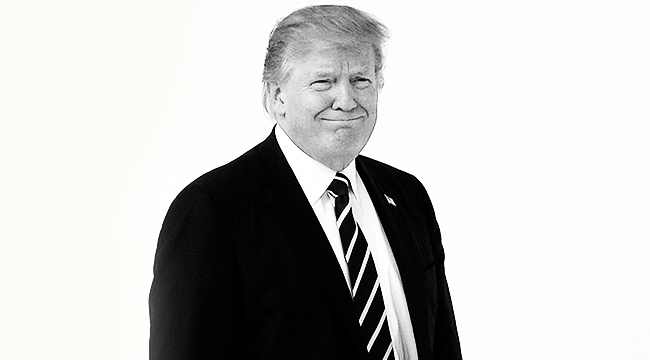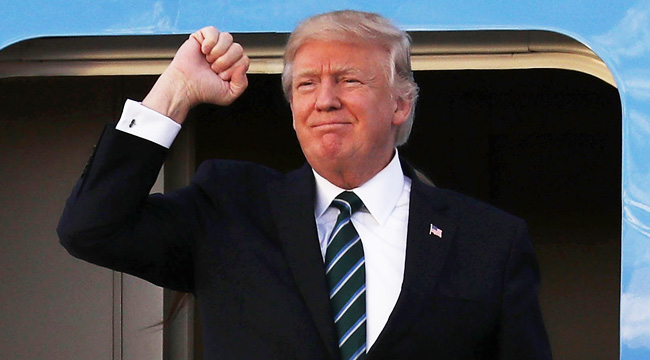
No matter your expectations for what a Trump presidency would be, chances are he (and the world) has surprised you in these first 100 days — a construct that he alternately downplayed and used as a benchmark to measure his administration’s accomplishments (with some negative fanfare).
This article isn’t meant to weigh in on whether Trump kept all his promises (something no politician ever does) or to declare whether these 100 days represent a positive or negative step for America — you can (and surely will) decide that for yourself. What we’re interested in is the lessons learned about Trump, Congress, the resist movement, the media, and the whole of the government. So, with that said, here are 10 of those lessons.
A President’s Legacy Is A Very Fragile Thing
There are certain things that Donald Trump can’t take away from President Barack Obama like the defeat of Osama Bin Laden, the bounceback following the great recession, and the historic nature of his election win. But it seems like Trump is taking a run at nearly everything else in an effort to fuel his own legacy. And when Trump leaves office, the same thing will likely happen all over again.
It’s a cycle. It’s also a relief if you’ve been horrified by Trump’s early actions (or Obama’s body of work, I suppose), but isn’t it also a little exhausting to see such clear evidence that we’re sort of stuck in a hyper-partisan loop where it’s always going to be one step forward or two steps back whenever someone new steps into power?
Ethics Rules Are An Unfunny Joke
Donald Trump knows that trouble doesn’t have a lot of staying power in the current media landscape where stories die quick if they aren’t fed or if they’re pushed down in our collective feeds by something new and shiny. Understanding this reality made him seem somewhat bulletproof as a candidate (to the extent that he was still able to win), and it’s proving equally useful as President, where toothless ethics standards have been ignored repeatedly with no real legal consequence.
To Trump, the resulting outrage (or bad PR) has been dealt with by undercutting the accusers, the rules, and everything that stands between him and his goals. Be they the hiring of his son-in-law and daughter as advisors despite nepotism laws, the continued refusal to release his tax returns, and concerns about conflicts of interest arising from the supposedly half-hearted divestiture of his business interests.
As Trump will tell you, he’s literally above the law on that last one, but maybe that needs to change.
Already, we’ve seen efforts at the state level to require the release of tax returns to get on the ballot. Opening those conflict of interest laws to cover the President might be a worthwhile pursuit, but it won’t be easy and it might turn into a court battle.
They Were Not Ready
Trump has been publicly annoyed by the slow confirmation process for his cabinet picks, putting the blame squarely on Democrats in the Senate (even though their power is limited). But according to the Washington Post, there are approximately 500 vacant senior level jobs that require Senate confirmation that the Trump administration has yet to push forward, and it’s starting to piss off cabinet secretaries whose jobs are hampered by working with a skeleton crew.
The WaPo report also portrays this as a problem born from a lack of organization during the transition and the gauntlet of high profile personalities that candidates need to clear in order to get considered. It’s things like this, vetting fails with former Labor Secretary-designate Andrew Puzder, and what seemed like a thrown-together healthcare plan that make it seem like the Trump team never really gave much thought to how they would govern if they won.
There Is No Presidential Pivot Coming
Trump has made it clear that he believes his mean-tweeting, braggadocious, and forceful style wins him support and has the potential to help him be a more effective President. And so, he gets into verbal scuffles with reporters that he then labels fake, obsesses over critics like Meryl Streep and SNL, floats thinly supported conspiracy theories, bashes a company for their business dealings with his daughter, and mocks his rivals.
What’s more surprising than the lack of a pivot (which, in hindsight, isn’t all that surprising) is the continuing presence of pundits who are so eager for that pivot to happen that they try to will it into existence whenever Trump stays on message during a speech or, apparently, drops a bomb. It’s all a bit silly and phony and gives off the idea that a track record can be tossed out the window to fit a narrative. Trump is who he is and it isn’t likely to change. Unless he feels like flipping the switch for a little bit.
Executive Orders Are Easy (Usually)

Candidate Trump bashed Obama’s ample use of executive orders as a sneaky way of getting around a hostile legislature but he’s been a big fan of the tactic in his first 100 days.
Trump has signed 32 orders on a variety of issues that have cut into Obama’s environmental protections, the regulatory state, and immigration policy. The latter made the most noise due to a botched and upsetting rollout and legal challenges that prompted another go at a travel ban (which was also held up by the courts), but there were other notable defeats. Trump’s “swamp draining” federal hiring freeze fell embarrassingly flat and his effort to cut off funding to sanctuary cities also ran into trouble in court and is now on hold.
Despite the mixed results, however, Trump’s executive order-heavy approach has given him something to take back to supporters whose expectations were set by an (overly?) ambitious set of promises for the first 100 days that Trump laid out in his Contract With The American Voter.
Congress Goes At Its Own Pace
Trump said he would “work with Congress” to introduce a list of 10 big proposals and “fight for their passage within the first 100 days” in the aforementioned contract, but he’s fallen short.
A detail-light tax proposal was released on Wednesday, and a deal may be in place to get an Obamacare replacement plan through the house, but that’s about it in terms of legislative victories for Trump. And even then, the tax fight is only just beginning, and the inclusion of an amendment that would allow states to gut essential benefits while erasing protections for those with pre-existing conditions may render the healthcare bill DOA when it gets to the Senate. Assuming it ever gets there. That still leaves infrastructure, school choice, community safety, childcare and eldercare costs, broad tariffs on companies that shift their operations overseas, and funding for Trump’s border wall as almost entirely untouched in Congress. This despite a favorable headcount in both chambers.
Why the gridlock? Congress moves at a glacial pace, and no matter Trump’s expressed urgency, that was never going to change. Additionally, while Trump may not put much stock in negative polls and loud dissent, it’s entirely possible that Republicans in Congress aren’t convinced that they can dodge electoral consequences if they take the same approach and start rubber stamping a potentially unpopular agenda. Regardless, Trump is surely learning that working with Congress can be frustrating and often on their terms.
Experience Matters When It Comes To Diplomacy
Throughout the election, Trump spoke with the bluster of a man who clearly believed that he could wing it when it came to diplomacy. After all, he watched all the shows, has a “good brain,” and consulted himself as a foreign policy advisor. But with North Korea and Syria (and by extension, Russia), the complexity of foreign relations has surely been made clear to Trump, even while his tough talk has mostly persisted. This has manifested itself in how easily his views change when in the presence of foreign leaders — as we saw with China and NATO. But while some may see that as a positive development that signals flexibility, it could also be taken as a dangerous sign of unpredictability that will make it harder for the U.S. to chart a course, diplomatically.
There’s A Whole Lot Of Smoke With Russia
Trump has tried to minimize and/or reframe the Russian interference in the 2016 Presidential Election. And when that hasn’t worked, he’s reportedly tried to misdirect. But after a little more than three months, it seems that there’s a lot more smoke with the Trump campaign and Russia than there was on election day. Will that trail lead to a fire? Will it lead to actual consequences for any of Trump’s advisors or Trump himself? Time will tell.
Trump Loyalists Aren’t Going To Be Shaken By Reports Of Hypocrisy Or Outrage
The love between Trump supporters and their man is strong and true. There are exceptions, of course, but despite policies that could upset their lives, outrageous statements, that Russian smoke, and evidence of hypocrisy and a penchant for flip-flops, Trump’s people remain largely unshook. Chalk it up to the cult of personality that has risen up around him or the tribal mentality that infects some when it comes to politics, but it’s going to take a lot to break apart Trump’s base.
Resistance Is Not Futile
Though no one would say it’s hard to get under Trump’s skin, protestors seem to have an easier time than most, with the President lashing out on Twitter and expressing outrage that people are taking to the streets against his policies (and him) even though the election is over. The oft-used playbook (one imagines, “Seed Doubt” is written on the cover) calls for Trump to mock the size of these protests while suggesting that they are paid to be there. And yet, the protests are working. Not in a “run him out of office” kind of way, but they’re making a noise and people are paying attention. And at times, these separate movements have forced change.
Would the Muslim ban have died as quickly as it did if people hadn’t flooded into airports to protest? Would the first attempt at an Obamacare replacement plan have been pulled from the floor if not for a concerted effort by activists to rally their members to call and write their representatives? And that’s something that is happening again as the latest healthcare bill looks to move through the house.
It would be asinine to try and paint this election as a good thing for those that are inclined toward activism. People don’t want to hone their skills at dealing with struggle and fear — they want to live a life unbothered by these things. But Trump’s win has clearly ignited a kind of positive passion that was maybe a little dormant before people realized how possible a Donald Trump victory was. And that’s certainly better than malaise.
The challenge, for these activists, will be to see if they can keep the energy up into the mid-term elections and beyond. That’s a long time to feast on small victories while enduring gut churning defeats, but it’s not like Trump is going to stop inspiring them with policies that are less than agreeable over the next 100 days, and the 100 after that, and so on. And maybe that’s the biggest lesson of them all: this is all still shockingly early in the game.
